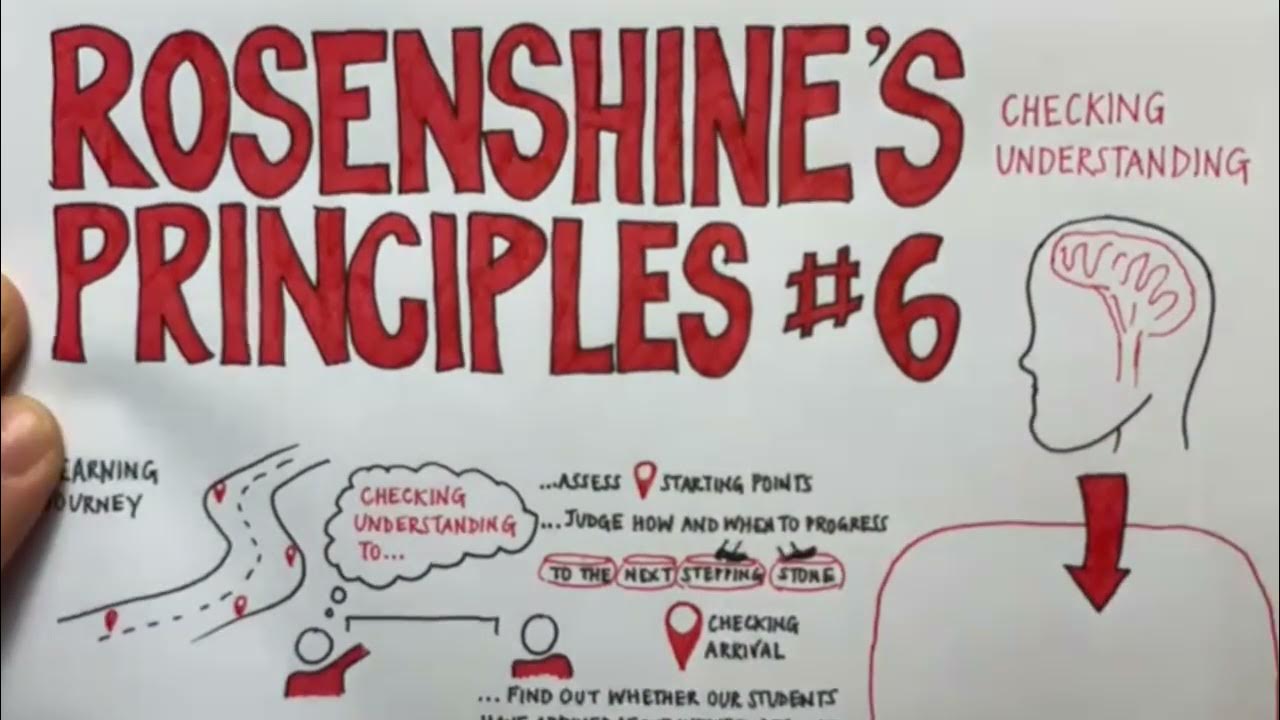Rosenshine principle #1
Summary
TLDRThis video explores Rosenschein's first principle, 'daily review,' highlighting its significance in enhancing student learning. Daily review involves a short 5–8 minute session at the start of each lesson to revisit previous material, strengthen memory, correct misconceptions, and support the progression of knowledge through stepping stones. By practicing overlearned material, students reduce cognitive load and build automaticity, enabling effective schema development. The video emphasizes active recall and varied methods, such as factual questions, multiple-choice justification, and practice quizzes, demonstrating how daily review reinforces learning, boosts retention, and prepares students to confidently build on prior knowledge in future lessons.
Takeaways
- 📚 Daily review is a short 5-8 minute period at the start of each lesson to revisit previous learning.
- 🧠 It helps both teachers and students assess starting points and correct misconceptions.
- 🔗 Daily review connects learning from previous lessons, supporting stepping stones and next steps.
- ⚡ Practicing material beyond initial mastery leads to automaticity and reduces cognitive load.
- 📝 Review strengthens connections among learned material to build effective schemata.
- 👥 Active involvement of all students is essential, encouraging recall from memory.
- 🤔 Short-term confusion and lack of fluency are natural when encountering new material.
- ✅ Daily review ensures knowledge is secure enough to build upon and correct errors.
- 🎯 Methods of daily review can vary: factual recall, multiple-choice justification, or practice problems.
- 📊 Daily review can be integrated into retrieval practice quizzes for weekly and monthly reinforcement.
- 🌱 Linking daily review with memory research enhances long-term retention and learning efficiency.
Q & A
What is the focus of the first principle discussed in the video?
-The first principle focuses on 'daily review,' emphasizing short, consistent review sessions at the start of each lesson to reinforce prior learning and correct misconceptions.
How long should a typical daily review session last?
-A daily review session should last approximately five to eight minutes at the beginning of a lesson.
Why is daily review important for both teachers and students?
-Daily review allows teachers and students to check their starting points, monitor previous learning, repair misconceptions, and ensure that knowledge is secure enough to build upon.
How does daily review help reduce cognitive load?
-By reinforcing previously learned material to automaticity, daily review reduces the demand on working memory, which is limited, allowing students to focus on learning new concepts more effectively.
What does overlearning mean in the context of daily review?
-Overlearning refers to practicing material well beyond initial mastery, which helps strengthen memory, increase automaticity, and ensure long-term retention.
What role does retrieval from memory play in daily review?
-Recalling information from memory during daily review strengthens connections between learned material, helping to build effective schemata and reinforcing long-term memory.
Can daily review help address short-term confusion in students?
-Yes, daily review allows teachers to monitor and correct short-term confusion or lack of fluency when students encounter new material, ensuring knowledge is accurate and ready for further learning.
What are some examples of daily review methods mentioned in the video?
-Methods include factual recall questions, multiple-choice questions requiring justification, sets of math problems similar to previous lessons, and integration into retrieval practice quizzes for weekly or monthly review.
How does daily review link to the concept of stepping stones and next steps?
-Daily review connects learning by ensuring students have mastered previous knowledge, which allows teachers to plan subsequent steps in the learning journey and build on existing schemata.
Why is it important that all students are involved in the daily review?
-Full participation ensures that every student recalls information from memory, which strengthens their understanding, reinforces learning connections, and reduces the risk of misconceptions persisting.
How does daily review relate to previous research on memory?
-Daily review aligns with memory research, emphasizing the benefits of repeated practice, retrieval from memory, and overlearning to build durable schemata and improve long-term retention.
Outlines

This section is available to paid users only. Please upgrade to access this part.
Upgrade NowMindmap

This section is available to paid users only. Please upgrade to access this part.
Upgrade NowKeywords

This section is available to paid users only. Please upgrade to access this part.
Upgrade NowHighlights

This section is available to paid users only. Please upgrade to access this part.
Upgrade NowTranscripts

This section is available to paid users only. Please upgrade to access this part.
Upgrade Now5.0 / 5 (0 votes)





